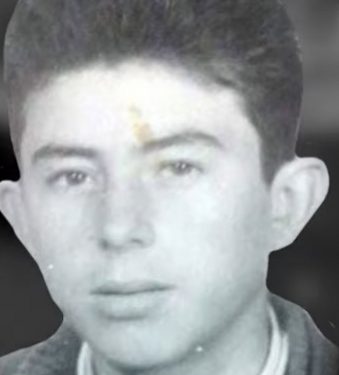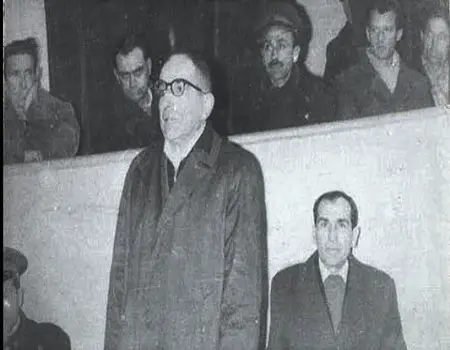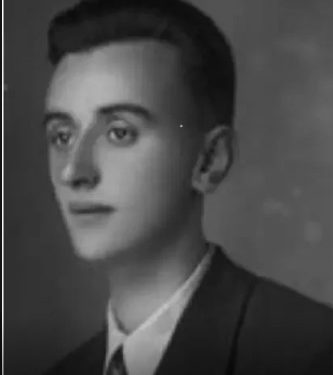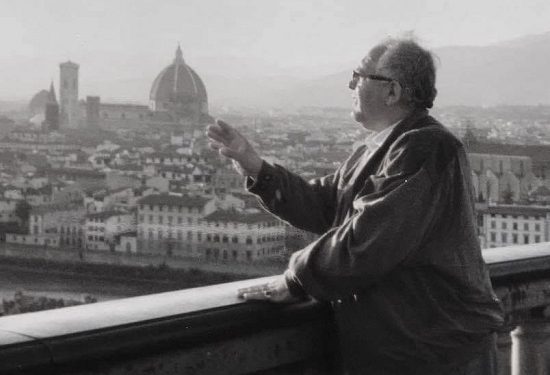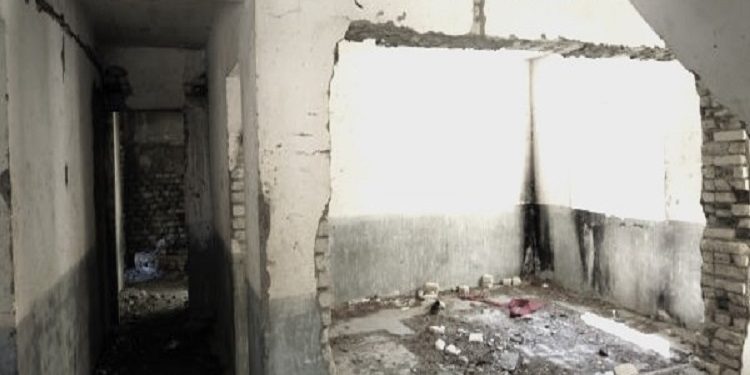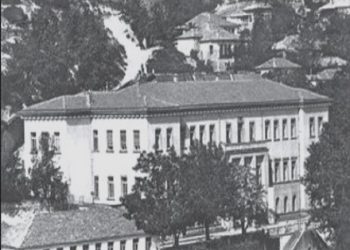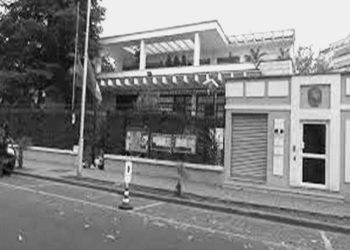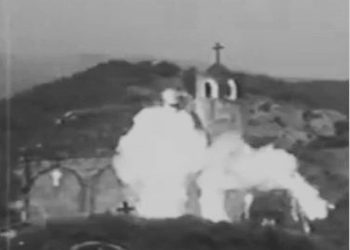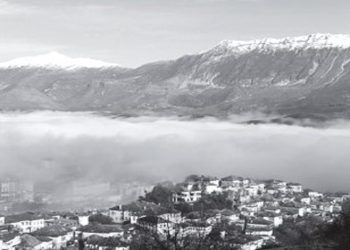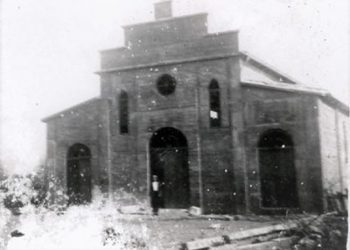By Shkëlqim ABAZI
Part twenty-three
S P A Ç
The Grave of the Living
Tirana, 2018
(My memories and those of others)
Memorie.al /Now in my old age, I feel obliged to tell my truth, just as I lived it. To speak of the modest men, who never boasted of their deeds, and of others whose mouths the regime sealed, burying them in nameless pits. In no case do I presume to usurp the monopoly on truth or claim the laurels for an event where I was accidentally present, even though I desperately tried to help my friends, who tactfully and kindly deterred me: “Brother, open your eyes… don’t get involved… you only have two months and a little more left!” A worry that clung to me like an amulet, from the morning of May 21, 22, and 23, 1974, and even followed me in the months after, until I was released. Nevertheless, everything I saw and heard during those three days; I would not want to take to the grave.
Continued from the previous issue
The Zefs!
Since there were several of them, I grouped them together.
Apart from the name, they shared similarities in character, upbringing, culture, behavior, resilience, hatred for communism, desire for life, and dreams of freedom, as well as the tact to convey these qualities to the younger generation.
Thus, there were many: Zef Pllumi, Zef Prela, Zef Ndoi, Zef Çoku, Zef Ashta, Zef Jushi, etc. Nowhere had I encountered so many namesakes, in such a small place, at the same time, with almost the same qualities, but with different professions and from different cities; one a priest, another a farmer, one a teacher, another a poet, one an officer, another a pastor, some from Shkodra, some from Lezha, some from Puka, some from Mirdita. In any case, they were models individually, unwavering in the idea they defended, and with moral and intellectual virtues that they displayed according to their nature.
I should mention them one by one, because their values were individual, but in this fragment, I will single out two: Zef Ashta and Zef Jushi, one an officer, the other a poet.
So, I chose these…!
Before I knew Zef Ashta physically, I had heard of him in the discussions of the elders when they spoke of events from ’43 or ’44:
“If Lieutenant Zef were present, he would argue differently…” they insisted almost in unison.
When they spoke of the officer from the North, I got the idea that he was a tall, rough, and knowledgeable man; because ever since I met a couple of big-bodied former gendarmes in Reps, I pictured old officers that way.
Whenever an event of a military nature, past or present, was mentioned, they spoke in superlatives, praising his personality, especially his competence as a teacher, so I added pedagogical qualities to my image, and now I imagined a giant, harsh, sufficiently civilized, and very cultured former officer.
I heard that he had been arrested right after the communists took power, around sixty, that they had released him, then arrested him again, and he was currently in prison for over twenty years. I also learned that he had joined the ranks of the ‘Balli Kombëtar’ (National Front) and belonged to the moderate wing, having been fascinated by the figure of Mit’hat Frashëri since his youth.
This is more or less what I knew, without knowing him physically.
When I was transferred to Spaç in September 1970, my friends recommended him as one of the people I absolutely had to meet to orient me in the new environment.
I got to know him through Myslim Fuatllari on the very first day, but he did not leave the impression I expected because I did not find the imagined man in his figure; the difference between the imaginary and the original was immeasurable, so much so that the concrete and the ideal did not match anywhere. He was a medium-height man, over fifty-five to sixty years old, gaunt, dry, hunched, far from the identikit of the tall officer. Apart from the sharp, ascetic face and the grey, expressive eyes, which were too large for his small face, there was no sign of a military man. But his soft timbre, delicacy, and gentlemanly tact made him interesting.
This means something remained of the image, the disappointment was not total. When I knew him as an Italian teacher, I realized my friends were right to dress him in superlatives. A great soul resided in his small body, a heart even greater beat within, which the multitude of years in prison could not weaken, the endless suffering could not extinguish his hopes, the absent freedom could not dry up his dreams, the undeserved hatred could not wither his love for people, for the nation, for Albania.
The miserable conditions had an inverse effect on his character and personality; from a career officer, they transformed him into a patriot and a servant of nationalism and Albanianism. He conveyed the virtues of a martyr, with his exemplary behavior and unwavering character, and displayed the olympic calm of the modern intellectual through his moral resistance.
In that personality, the idealist’s belief in a better tomorrow was intertwined with the nobility of the pure nationalist who offered unconditional love to the Homeland, even when it became a stepmother. The indefatigable intellectual offered knowledge with the devotion of a nun giving a glass of water to one who is dying, while the brilliant educator remained a pleasant and intelligent conversationalist without becoming monotonous.
He was a sincere, resourceful, and self-sacrificing friend without becoming bothersome. A model of modesty, honesty, perfection, intelligence, bravery, and a moral pillar where the youth found support. Although in uncomfortable positions and difficulties, when many might have given up, he resisted by displaying the values of Shkodra’s civility.
Zefi represented the virtuous type with a sea of virtues. Christian education was intertwined in him with the spartan life, perhaps ingrained from his years of academic studies in Italy; elegance was mixed with refinement, and discipline with a word of honor, consolidated during his service in the ranks of the national army, qualities that blended with Olympic coolness and a sense of judgment in unusual situations.
Alongside the intelligent teacher and the innate exactingness, the cultivated talent from cohabiting with the cultural elite in political prisons stood out in his teaching. In the Catholic environment, he acquired indulgence, and dogmas had not contaminated his mentality; instead, he perfected liberal, Rousseauist tolerance. If you considered the endless range of cultural and secular sources that interested him, you would never see him praying in solitude; you might even make the fatal mistake of listing him among atheists. But no, Zefi believed in God!
A polyglot par excellence, he mastered old and modern Italian, Latin, ancient Greek, French, and Spanish perfectly. He preferred history, literature, philosophy, and sciences without distinction. He liked to debate at academic levels, but he was rational and laconic; what others would drone on about for hours, he summarized in a sentence.
Despite his erudition, he never acted superior, reaching the height of modesty when he asked for our opinion, his students, on the meaning of an expression or idiom. Naturally, we valued his erudition and measured our words a hundred times before answering him, because the incorrigible scrupulous man would verify our word in dozens of sources before taking it for granted.
Although our age, origin, profession, and preparation did not coincide, I found in him the ideal leader, whom he never accepted being. We became close quickly thanks to the recommendation and the influence of the circle of friends, where Zefi held a dominant position, because he knew how to build ideal relationships that suggested friendship, so to speak, he created balances and rapports where no one felt inferior; on the contrary, with the value he gave to friendship, he almost turned it into a cult.
He knew how to reprimand with style, advise with finesse, and recommend with tact without being arrogant or megalomaniacal. I often encountered him in debates where Zef’s dominant virtues were eloquence or style in presenting and defending ideas, the intuition to grasp the essence, agility in dealing with interlocutors, and the tact to get out of the loop of difficult discussions without creating enemies. During a patriotic discussion about the Kosovo and Chameria issue, directed by the Cham from Konispol, Sulo Veshi, the tones rose, and the dormitory buzzed with debate, but agreement could not be reached on some aspects.
Everyone threw out and defended ideas, not allowing space for the other, until Zefi, with olympic wisdom and typical intelligence, intervened and extinguished the excessive zeal: “Dear Sulo, as far as the eagle can fly without wings, so far can Albania exist without Kosovo and Chameria! The participation of everyone, who presents and defends theses as if they were in a National Assembly, shows that the Homeland still has men to protect it, so I think that Albania will be made, it will be made, and it will be made. Maybe our generation will not have that fortune, but we contribute by feeding the lamp of nationalism!” and they parted with their arms around each other, although one was from the northernmost end and the other from the southern, like brothers born of the same mother.
As patient as he was with the well-intentioned youth, he was equally intolerant of the scoundrels. N. C. from Devolli, whose name I am not mentioning for ethical reasons, although the prisoners of that period will undoubtedly know who I am talking about, was brought to Spaç at the end of 1971, or later. Since he belonged to a well-known family in Devolli, he was given a place in their circle. This was enough for anyone who aimed for an honest prison sentence, but the young man liked neither work nor sacrifice, so he chose to benefit from associating with the head of the technical office, Medi Noku, behavior that was noticed, and everyone distanced themselves from him, especially the patriots.
In that environment, where no fly could pass secretly and life flowed transparently like in an aquarium, everyone was afraid of the stain of shame because everyone was both controllers and controlled, being twenty-four hours non-stop with the same people, in the same environment, for weeks, months, and years. The individual did not enjoy privacy, and the possibilities for choice were limited, so one had to accommodate to the collective way of life in the most moral form. Whoever made another choice was looked at askance, consequently the healthy part distanced themselves.
There, a kind of gap had been created between two categories, marking the line of demarcation. Since the man from Devolli chose comfort, they abandoned him to his fate, and he sank under the tutelage of the head of the technical office and the operative, who tried to exploit him to penetrate the circles of resistance. Zefi enjoyed indisputable respect among the Devollis, so under the pretext that he supposedly wanted to learn Italian, they instructed him to approach him. But the old man was an expert in prisons, he spotted the trap they were setting for him and drove him away with disgust.
One winter afternoon, when the temperature might have been minus twenty degrees, I was with my friends, Çaush Çoku and Gëzim Medolli, at Zef’s bedside, for the Italian lesson. The old man was huddled under the torn blanket, from which the red tip of his nose emerged. “How much you resemble Dante with that hood over your head, Mr. Zef!” Gëzimi taunted him.
“I wish I could resemble him, but we are light years away; he entered the hell of the dead willingly, they forcibly threw me into the hell of the living!” Zefi replied, laughing. – “But it seems Trestenik has given birth to a Dante himself, and has taken this chance away from me!” he good-naturedly alluded to Gëzim’s pale face, thin, faded, with a nose like a cleaver’s blade, who indeed resembled Dante’s profile, so we often joked about the physical qualities of the prison poet; we even suggested he use the resemblance for a pseudonym, but he chose the alias “Goethe” (Gëzim Tresteniku), because he admired Teutonic determination.
As we were joking with this improvised anecdote, our laughter was cut short because N. C. headed towards the old man’s bed, who, as soon as he saw him, threw off the blanket, opened his eyes, and jumped up, hitting his head on the floorboards above.
“Why did you trouble yourself?” he snapped at the newcomer.
It was the first time I saw the professor lose control.
“I want to learn Italian!” N. C. replied with a feigned smile.
“Ah-ah, I didn’t know that!” the old man said ironically.
“You are the most renowned professor here!” the young man added to please him.
“I was once, but now I’m old and sick!” he cut short the flow of praises. – “And I’ve thought about abandoning these who started earlier! Moreover, my Italian is a language of toils and troubles; neither Dante nor Petrarch, who suffered exile from their native cities, saw any good from it,” he added ironically.
“Anyway, I have decided to learn Italian!” N. C. insisted.
“Very good, I advise you to learn it with Medi Noku and Fejzi Liçaj, their Italian is more convenient and easier to master,” a sarcastic light passed through the old man’s grey eyes.
“I wanted to learn with you!”
“You have nothing to gain from me, you’ve already surpassed my teachings, young man! May God show you mercy!” From that day on, he was never seen approaching the old man again. Zefi remained young, even preferring his friends to be so. Perhaps his body shrank, his strength diminished, his physique weakened, his face faded, but his heart remained youthful, until the day he died. He refreshed his memory with the latest news in science, technology, literature, art, culture, and as an eternal dandy, he sought out current events even where he did not enjoy the luxury of choice.
“You young people, spend your time reading whatever falls into your hands, I am old, and I have to struggle to catch up with the new things!” Naturally, Zef’s excuse was the most effective method to orient us towards what was necessary, but as young people, we conceived life differently, we didn’t understand that time flowed and did not turn back; now that I have reached almost his age, I correctly appreciate the delicacy of the esteemed professor.
In him, we saw the energetic elder, the devoted missionary, the person who disregarded localism; on the contrary, he scorned those who encouraged this phenomenon. Divisions were unacceptable to him, so he built relationships worthy of gentlemen. His friends belonged to all cultures, all faiths; I can affirm without error that the majority had opposing beliefs.
We knew him as a Mit’hatist, with liberal convictions, logically cool-headed, with perfect education, broad culture, brilliant intellect, open to the interlocutor, listening patiently to every opponent, even giving them space to express themselves without interruption, and he did not oppose them even when they insulted him with vulgar language, which is why they considered him an excellent polemicist.
From the beginning, I knew he was frail, but I never heard him complain. He suffered from a collection of diseases, but he endured the crushing of his bones and the fragmentation of his cavernous lungs with the stoicism of a martyr. Precisely for this, he needed slightly better-quality food, which he could not afford, because he was permanently a ‘six-hundred’ ration man; even when they put him to work, they sent him to the maintenance brigade, which in any case did not increase his ration by a single crumb.
He did not receive much help from his family, because his sister struggled to be there for him, but she was very poor and found it impossible to come to Spaç often due to the distance and lack of funds, so she tried to send him a poor package here and there, and letters just to keep him updated on the latest news. Thus, he was left with the communal cauldron, meaning the watery portion.
We, his friends, knew his difficulties and tried to help him, but he refused. Once I wanted to give him something, but I felt bad when he replied: “The rich share their income (L’moshën e ndajnë të pasunit) on holidays, joyful occasions, or sorrows for orphaned children, widows, the weak, the disabled, the poor, but here we are all like that, my friend!” That was true, but we too had devised original methods, organizing a bread feast when the family came, and sitting the elders like Zefi at the head.
In his youth, he devoted himself to his career and the national cause. He was later arrested and convicted, and then again, released but arrested again, so he could not start a family. He poured all the love for his missing children into his fellow sufferers. Together with Zef Jushi, they focused on the young prisoners as successors, where they envisioned the future of the nation, and at the same time, the heirs they would have liked to raise and educate themselves. Unable to realize this sublime dream, they melted their energy into the noble mission of the educator.
Ashta, the earthly missionary, aimed for mental health, physical resistance, and the strengthening of personality, displaying the qualities of a nationalist intellectual through personal sacrifice, urging the youth towards positivism and knowledge to become worthy of themselves, valuable to their family, and devoted to the Homeland. His ideas soothed the wounds of the mind. Meanwhile, Jushi, in the role of the divine missionary, greeted the dawn with polished sounds, relieved souls with Orpheus’s lyre, calmed hearts with poetic muse, and pierced the communist darkness with playful words.
They sowed the seed of tomorrow and plowed the barren land like a yoke of oxen furrowing the fallow land; the part that one left empty, the other completed, in the best possible way. Precisely for these qualities, which strongly influenced the formation of the youth of those years, Ashta and Jushi were christened “The Pen of the Zefs” (Penda e Zefëve), figuratively the ox’s yoke (penda e qeve), with the underlying meaning of the goose quill (penda e patës), as a symbol of writing.
Since the name “Zef” was common among the Catholic northerners of Shkodra, Nënshkodra, Puka, Lezha, and Mirdita (in Spaç prison they reached ten, not counting the policemen, because with them the number exceeded twenty), the use of pseudonyms or toponymy began. Thus, Zef Ashta was called “ashtë” (bone/remains), a designation that implied resilience and spartan education, as well as an unbreakable character. But you could also hear him called “eshtër, koc, kockë, kokallë, rashtë” (all synonyms for bone/remains), depending on the interlocutor’s dialect.
Father Zefi (Pllumi) was christened “pllumb, zog, kolomb” (dove, bird, colombe), but most often “zhgabë” (eagle), for his scrutinizing gaze and grim expression, and also “hardhia” (the vine), since this was the name of the neighborhood where he was born. For the others, they found the practical solution of using the toponymy of their origin, such as: “Nënshati, Serreqi, Sheldija, Gomsiqa, Kashnjeti,” etc. Memorie.al




